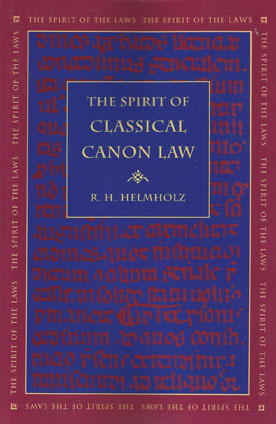
Despite the long reach of classical canon law - across Europe, well into modern times, and into such secular subjects as theft, wills, and the sale of goods - its size and complexity have kept many historians from exploring it in their work.
R. H. Helmholz illuminates the moral, social, political, and religious values in canon law as it developed through the seventeenth century and reveals the attitudes and formal techniques of the authors, practitioners, and interpreters of canon law.
Helmholz discusses the Corpus iuris canonici, texts which form the foundation of canon law, and the sources the Corpus draws on, including the Bible and Roman law. He then considers fourteen major areas affected by the laws such as the governance of the Church (in particular the law of election of bishops), the sacraments (baptism), and legal sanctions (the law of excommunication).
The Spirit of Classical Canon Law provides scholars an ideal entree into this foundational area of the law.